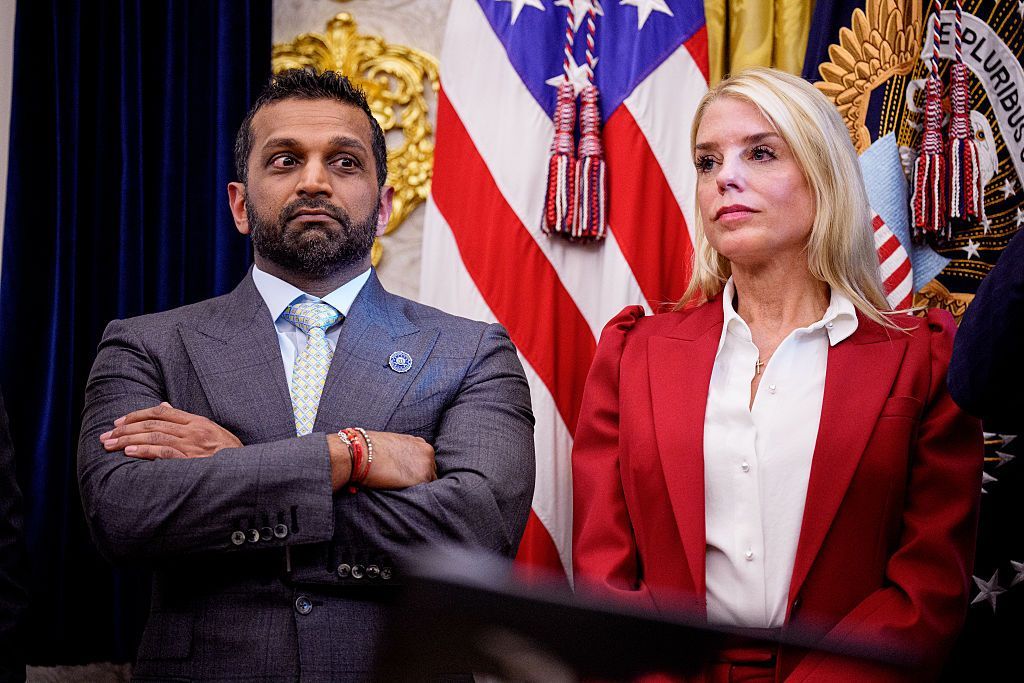
Dozens of former US Department of Justice attorneys have now gone on record to describe the unprecedented corruption of federal law enforcement taking place during President Donald Trump’s second term.
In a lengthy story published on Sunday by the New York Times, the former DOJ attorneys described rampant politicization of prosecutions, directives to dig up evidence on Trump’s political foes, and orders to drop investigations into potential terrorist plots and white-collar crimes.
Several attorneys told the paper that the corruption of the DOJ began on Trump’s very first day in office when he issued a blanket pardon to everyone who had been convicted of rioting at the US Capitol building on his behalf on January 6, 2021, in a last-ditch effort to prevent the certification of former President Joe Biden’s electoral victory.
Gregory Rosen, who oversaw the unit at the DOJ that prosecuted January 6 rioters, told the Times that he felt “numb” seeing the pardons of the rioters, but he nonetheless facilitated the pardons because he understood they were within the president’s constitutional powers.
Mike Romano, a prosecutor who worked on January 6 cases, said that he had to resign as soon as he saw the broad scope of the pardons, which included rioters who were guilty of assaulting police officers.
“It’s incredibly demoralizing to see something you worked on for four years wiped away by a lie—I mean the idea that prosecution of the rioters was a grave national injustice,” he said. “We had strong evidence against every person we prosecuted.”
The mass pardon of the Capitol rioters was only the beginning, as prosecutors said that this politicization soon swept over the entire department.
In early March, for instance, Trump signed an executive order targeting law firms that had in the past represented prominent Democrats. Among other things, the order demanded federal agencies cancel government contracts with the firms and strip the firms’ employees of their security clearances.
The orders also accused some of the firms in engaging in supposed racial discrimination for maintaining policies related to diversity, equity, and inclusion (DEI).
Dena Robinson, a former attorney at the DOJ’s Civil Rights Division, told the Times that the DEI investigation into law firm Perkins Coie was a particularly extreme example of the department’s politicization under Trump.
“The idea of the investigation was that Perkins Coie supposedly engaged in illegal discrimination against white men,” she explained. “But Perkins Coie is an extremely white firm—only 3% of the partners are Black. When my colleague pointed that out, the leadership didn’t care. They’d already reached their conclusion.”
Robinson said that this attitude was emblematic of how Trump appointees conducted investigations: They begin with desired conclusions and systematically ignore evidence that undermines them.
“I wouldn’t even call it the Justice Department anymore,” she said. “It’s become Trump’s personal law firm. I think Americans should be enraged.”
Another aspect of the DOJ under Trump that has drawn scrutiny has been his use of pardons for political allies, including his decision last month to pardon Changpeng Zhao, the founder of cryptocurrency exchange Binance, who pleaded guilty to money-laundering charges in 2023, and who had helped boost the value of the Trump family’s own cryptocurrency venture.
A new investigation from ProPublica found that Trump’s use of the pardon hasn’t just been relegated to prosecutions that took place during Democratic administrations.
The ProPublica report found Trump had wiped out convictions in “at least a dozen criminal cases that originated during his first term,” many of which involved politicians convicted of taking bribes or engaging in kickback schemes.
Frank O. Bowman III, a professor emeritus of law at the University of Missouri, told Pro Publica that the Trump pardons taken together are part of what he described as “the systematic destruction of the Justice Department as an objective agency that seeks to uphold the law and fight crime.”
In addition to this, Joseph Tirrell, former director of the Departmental Ethics Office, told the Times that the Trump DOJ has been hacking away at rules that bar law-enforcement officials from accepting gifts.
In one instance, Tirrell said he tried to intervene to stop DOJ employees from accepting cigars given by mixed martial arts fighter Conor McGregor and a soccer ball from the Fédération Internationale de Football Association (FIFA).
“I felt like I really had to go to the mattress to convince the AG’s office: You can pay for the item or you can return the item or you can throw the item away,” he said. “There’s no other way to do this.”
Shortly after this, Tirrell said he got a call from the FBI general counsel inquiring “about changing exceptions to the gift rules because his boss, [FBI Director] Kash Patel, felt like he should be able to accept more expensive gifts.”
Tirrell said that he then reminded the counsel that “his client was not Mr. Patel, but the United States.”
Patel in recent weeks has come under scrutiny for some of the perks he’s taken during his time as FBI director, including using the FBI’s private jet to fly to a wrestling event where his girlfriend, country music singer Alexis Wilkins, was performing the national anthem.
MS NOW reported on Monday that Patel has also given Wilkins “a security detail made up of elite FBI agents usually assigned to a SWAT team in the FBI field office in Nashville,” an unprecedented arrangement for the girlfriend of the FBI director.
Christopher O’Leary, a former senior FBI agent and MS NOW law enforcement contributor, said that there is “no legitimate justification” for granting Wilkins this level of security.
“This is a clear abuse of position and misuse of government resources,” he said. “She is not his spouse, does not live in the same house or even the same city.”
From Common Dreams via This RSS Feed.
Can’t expose something that wasn’t hidden - although I am sure there is a lot more than meets they eye


